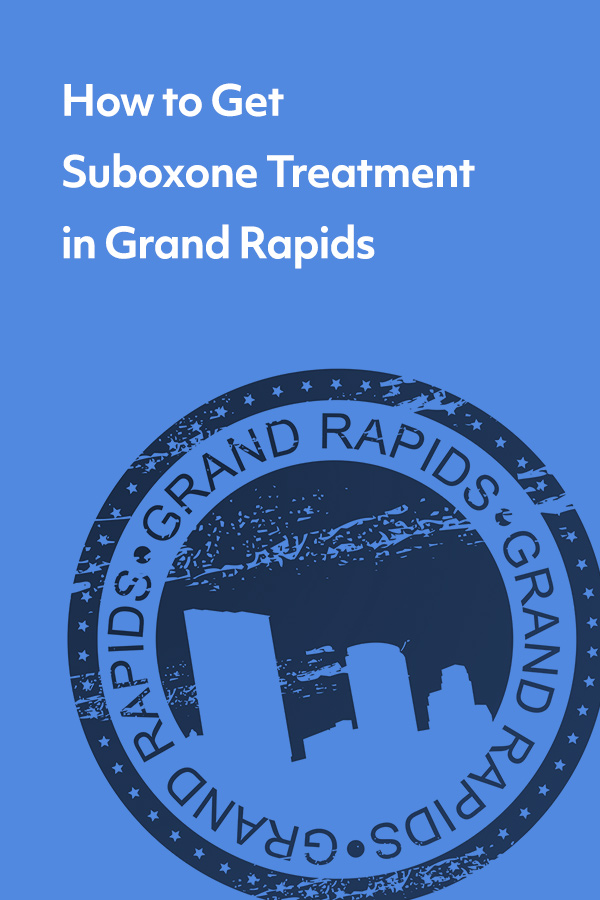Do you have questions about getting Suboxone treatment in Grand Rapids? We have answers!
In the year between April 2020 and April 2021, Michigan lost more than 2,900 people to drug overdoses. This represents a 19% increase in overdose death over the previous year. Across the nation, the increase was even higher, reaching a record high of 100,000 deaths. Grand Rapids, Michigan is responding to this crisis in ways like equipping police with naloxone to save lives in case of overdose. But when the residents of Kent County struggle with opioids, they need more than just rescue medicine. They need treatment options
If you or a loved one has been struggling with opioid addiction, medication-assisted treatment might be the support you’re looking for.
The basics about Suboxone and medication-assisted treatment
Suboxone is a prescription medication that helps you get through opioid withdrawal and stabilizes you for long-term recovery. Suboxone is comprised of two medications: buprenorphine and naloxone. Zubsolv and Bunavail are other brand names that contain the same medications (buprenorphine/naloxone). These medications are approved by the FDA to treat opioid use disorder (OUD). Programs that use these medications are called medication-assisted treatment (MAT).
SAMHSA, the National Institute on Drug Abuse (NIDA), and the World Health Organization all endorse the use of MAT and recognize its efficacy in treating opioid addiction. Research shows that medication-assisted treatment has these outcomes:
- Improved patient survival
- Increased retention in treatment
- Decreased illicit opioid use and other criminal activities among people with substance use disorders
- Increased patients’ ability to gain and maintain employment
- Improved birth outcomes among pregnant women with substance use disorders
Studies demonstrate that MAT is a far more successful treatment of opioid use disorder than more traditional alternatives, and results in less likelihood of overdoses.
The bottom line is that Suboxone is effective, saves lives, and keeps people in recovery. Unfortunately, Suboxone isn’t accepted by large portions of the treatment and recovery community. Less than half of treatment centers offer any type of medication, and less than a third of patients struggling with opiate misuse ever receive it.
Getting Suboxone treatment in Grand Rapids, Michigan with Workit Health
At Workit Health, all of our clinicians are able to prescribe Suboxone. Our doctors in Grand Rapids, MI accept many insurance plans, including several Medicare and Medicaid options, as well as self-pay. You can click here to check your coverage. The Workit Health program is 100% virtual, from doctor’s visits to counseling to drug testing. All of these take place in our innovative, secure app.
Workit’s telemedicine program means that you can receive Suboxone treatment without going away to rehab or in-person treatment. You can keep your treatment as private as you choose, receiving your care from home. This also means that if you or a loved one are still vigilant in social distancing, you don’t have to spend time in a physical clinic to meet with your care team or take part in group therapy.
How to find a non-Workit Suboxone provider in Grand Rapids
Buprenorphine has been approved for office-based treatment, so you don’t have to go to a dedicated Suboxone clinic. If you have a primary care doctor with whom you have a good relationship, you can ask them about prescribing Suboxone for you. Some general practitioners have added addiction to their primary care service offerings, so it is possible that your doctor has the certification and waiver to prescribe Suboxone. But be aware that if they do not have this waiver, they may be unable to prescribe Suboxone to you, even if they want to.
Psychiatrists can also provide resources and support to treat addiction. If you already have a great doctor, ask if they will prescribe Suboxone to you directly or if they can refer you to another doctor who can help you.
You can also search for a Suboxone practitioner in your area using the Buprenorphine Practitioner Locator from SAMHSA.
How does Suboxone work?
Suboxone is buprenorphine and naloxone. Buprenorphine is a partial agonist opioid. It attaches to opioid receptors with a strong binding ability, which allows it to replace and block other opioids so that they become ineffective. Because buprenorphine has a longer half-life than many other opioids, it creates a steadier effect on the receptors, creating a lower propensity for developing tolerance. It can help to reduce cravings and withdrawal symptoms without producing euphoria (or a “high”).
Suboxone is taken sublingually, which means dissolving it under your tongue. Buprenorphine is absorbed well through the mouth but less well through the stomach and intestines, so it’s important to let it fully dissolve instead of swallowing it.
The second ingredient in Suboxone is naloxone. Naloxone is an opioid antagonist, which means that it binds to opioid receptors and can reverse and block the effects of other opioids. Naloxone is not absorbed well through the mouth, so it has little to no effect when Suboxone is taken as directed. It is included in the medication to reduce the likelihood of it being diverted or misused.
Are there any side effects of Suboxone to be aware of?
As with any medication, Suboxone has some potential side effects to be aware of. Common side effects of Suboxone include:
- Headache
- Nausea
- Vomiting
- Dizziness
- Increased sweating
- Constipation
- Sleepiness
- Muscle aches
- Erratic heartbeat
- Difficulty concentrating
- Numbness in the mouth
- Trouble sleeping
- Respiratory depression (slower breathing)
According to doctors, the most concerning of these side effects is respiratory depression. People who abuse or misuse Suboxone are more susceptible to this side effect and should consult medical treatment immediately if it occurs.
The majority of people using Suboxone for opioid treatment do not experience serious side effects and report that the side effects they do experience diminish as they adapt to their dosage. If you begin to experience any serious side effects, contact a medical professional immediately.
The opioid epidemic is hitting the residents of Grand Rapids and Kent County hard. When you or your loved ones are struggling with addiction or dependence, it can be confusing to try to understand your options. Suboxone treatment is effective for many, helping them get through the agony of withdrawal and reducing cravings so that they can get their lives back. It might be the solution you’re looking for.









